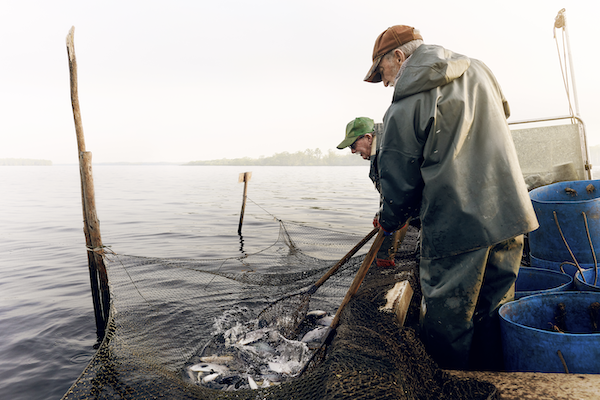Last of the Chowan River Pound Netters: a Chat with Herbert Byrum
Reprinted from Tradewinds Magazine, 2021 by B. Garrity-Blake. Photo by Tyler Northrup, courtesy of Locals Seafood
“Been deer hunting but it’s raining now so I can talk,” 75-year-old Herbert Byrum said on the phone. He was sitting in his truck honking for his dog Willy to come. He’d been hunting in the rural area of Indian Neck not far from his home at Cannon’s Ferry on the Chowan River.
“Willy ran the coyotes today instead of the deer – one was large as a German Shepard!”
Herbert Byrum was in good spirits and happy to talk. He and his brother Bobby are among the last big pound net fishermen in the region. They were once top herring harvesters until the fishery was closed in 2007 to ease fishing pressure on depleted stocks.
“I inherited pound net sets from dad and we borrowed out some from old fishermen,” Byrum explained. “Some of the places we’re fishing, my Granddaddy fished and my Granddaddy’s brother fished. The places were handed down through the family.”
Each pound net set is permitted by the state. The Byrum brothers hold sets eight through 25, an indication of how long their family has been in the business. Despite the moratorium on herring fishing, Herb and Bobby are able to continue pound net fishing for white perch, striped bass, and blue catfish.
“Two thirds of the money we make now is off blue cats!” Byrum exclaimed. Blue catfish are an invasive species that were released into Virginia waters to improve sport fishing in the 1970s. Today the massive fish – up to five feet long and 100 pounds -- eat everything in sight.
“We’re catching blue cats that are 40 pound, and there’s a lot of them,” Byrum said. He emphasized that back in the day, blue catfish were non-existent and striped bass were not as plentiful in the river as they are today.
“The herrings will never come back as long as you have that many predators that’s eating them.”
According to historian David Cecelski, the Chowan – a broad, tannic-tinted river lined with cypress-trees -- supported one of the largest river herring fisheries in America from the mid 1700s through much of the 20th Century.
“When I was growing up at Cannon’s Ferry, the whole street where the big cutting house was and all the fish houses were, you couldn’t get another car or truck in there for all the people on Easter Monday,” Byrum recalled. “They’d be a thousand folks down in there buying fish and cooking fish!”
The festive atmosphere was not only because of the Easter holiday. It was also a celebration of the annual arrival of massive schools of blueback and alewife herrings, moving from saltwater to freshwater each spring to spawn. This provided a once-a-year opportunity for folks to make money and stock up on fish for home consumption.
“Most of the time your herrings would start about the tenth of April and go until about the tenth of May,” Byrum explained. “A four-week season to catch and haul as many as you could catch.”
African Americans have long played a prominent role in the herring fishery, from Antebellum times when enslaved plantation workers hauled in the great nets from the riverbanks to the modern era, with black women and men doing much of the shoreside processing. Herring was important to the economy and culture of riverside communities throughout eastern North Carolina, especially in the Albemarle region.
“Herrings kept this part of the country living during the Depression,” Byrum pointed out. “Everybody put up a lot of herring – salted, corned herring -- eating it for breakfast, dinner, and supper. And collards, black eyed peas – the old people, that’s what they were used to eating.”
Some black families were compelled to move north for job opportunities. But each Easter they’d return to their home community, making sure to bring a cooler to fill with herring. The taste of herring was so synonymous with spring gatherings on the Chowan that the North Carolina Marine Fisheries Commission set aside a small “heritage” quota of four thousand pounds for local festivals from 2007 to 2015 rather than enact a total moratorium of the fishery.
“Perry Wynns Fish Company would cut 100, 150 thousand pounds a day,” Herbert Byrum said. “They had 50 people cutting herrings for a solid month, and 25 guys working in there to salt the herrings, shuffle them around, and put them in great big wooden vats. You had 20 boats up there fishing, each boat with three guys working.”
Perry Wynns, which had a facility in Colerain on the west side of the Chowan as well as a cutting house on the east side, continued to process herring until 2003 when their Colerain facility got destroyed in Hurricane Isabel. Several other fishing operations in the Albemarle region harvested herring for the fish and roe market, while a few found alternative uses.
“Ed Ward’s company sent herrings to Zapata Haney in Reedville, Virginia, a menhaden processing company,” Byrum said. “One year they sent 19 tractor trailer loads of herrings from Cannon’s Ferry.” Some of the herrings bought by Murray Nixon Fish Company went to Cajun country, according to Byrum. “Nixon sent them down to Louisiana for crawfish bait.”
For communities along the Chowan and nearby rivers, lack of a herring fishery is hard to reconcile.
“In the spring of the year, it’s like getting the itch,” reflected Byrum. “It’s all my brother and I have ever done since we were big enough to bail fish on our daddy’s boat -- it’s something you look forward to doing.”
Although the herring fishery has been halted for fourteen years, Herbert Byrum and his brother Bobby still make a decent living fishing their pound nets. A pound net intercepts fish with a long fence of net tied to black gum stakes, funneling them into a “pound” or corral, resulting in a live fishery.
“We used to have 20 boats that fished pound nets out of Cannon’s Ferry. Nowadays it’s just my brother and I,” Byrum said. They typically set their nets in February when they think the danger of ice is over.
“If it gets rough and temperatures go down in the teens, ice will start building up on that seine. Once that seine freezes, it’s just like a knife cutting it. Rips it right on down underneath the water. It can get so much weight on there that it’ll break your stakes off. You have to pay attention to Mother Nature.”
The Byrum brothers once fished 36 pound nets, but now limit themselves to a dozen.
“Fisheries people said if you cut back on your nets and pounds of fish, herrings will come back and you can catch more fish down the line. On and on until they closed the season – their models didn’t correlate with fishing. What’s in your head isn’t what’s in that river!”
The Byrum brothers build and mend their own pound nets, cutting pieces from old nets and sewing sections into the working nets.
“We keep repairing the ones we have. That’s the only way we can stay in it.”
Herb’s younger brother Bobby suffers from health problems but keeps fishing.
“My brother hooks up to home dialysis every night at six o’clock and gets off every morning and he’s on that boat. He’s still pushing.”
Herbert Byrum doesn’t see future generations stepping up to carry on the trade.
“Fishing pound nets is a lot of work. People like an easier job. When we first started fishing with my daddy, every time you bailed a net, it held 30 pounds, and the boat would hold 10 thousand pounds of fish. When you got back to the dock, you had to bail that same 10 thousand pounds of fish into a trough - sometimes we did that two or three times a day!” He laughed and added, “It’s just like shoveling up dirt, but you’re shoveling up fish.”
The brothers heft lighter loads of fish today compared to the heyday seasons of herring, but the work is far from easy.
“We still bail a lot of weight, but nowadays we grade the fish in the river so we can throw the herrings back live. We’ll dip 12, 15 fish at a time - take the white perch, catfish, rock -- and release the herring right back into the river.”
How does a 75-year-old maintain the stamina for such a labor-intensive fishery?
“I’m not bragging, but every time I go to the doctor they’ll tell me ‘You sure are in good shape for your age!’ I say, 'If you fish pound nets you stay in good shape!'”
Byrum added that it helps to be satisfied with one’s work.
“I ain’t never got rich, don’t never expect to get rich, but I’m probably a lot happier than most folks are,” he said. “You learn to use your head, when to go, when to stay home. Like playing poker, when to hold ‘em and when to fold ‘em!”
The Byrum brothers intend to uphold the tradition of pound net fishing on the Chowan River as long as they are able.
“We’re going to keep fishing ‘til we die,” Herbert Byrum declared. “We’re not going to give it up. I tell people I hope I’m right in the boat when I fall dead!”

